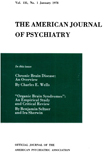Amantadine versus trihexyphenidyl in the treatment of neuroleptic- induced parkinsonism
Abstract
Amantadine is a putative dopaminergic compound known to be therapeutically effective in idiopathic and postencephalitic Parkinson's disease. In a double-blind placebo-controlled crossover study of 39 psychiatric inpatients, amantadine and trihexyphenidyl were equally effective in treating drug-induced parkinsonism, and amantadine produced fewer and less severe side effects. The authors suggest that amantadine is an effective alternative to atropine-like agents, with fewer implications for long-term risk of tardive dyskinesia.
Access content
To read the fulltext, please use one of the options below to sign in or purchase access.- Personal login
- Institutional Login
- Sign in via OpenAthens
- Register for access
-
Please login/register if you wish to pair your device and check access availability.
Not a subscriber?
PsychiatryOnline subscription options offer access to the DSM-5 library, books, journals, CME, and patient resources. This all-in-one virtual library provides psychiatrists and mental health professionals with key resources for diagnosis, treatment, research, and professional development.
Need more help? PsychiatryOnline Customer Service may be reached by emailing [email protected] or by calling 800-368-5777 (in the U.S.) or 703-907-7322 (outside the U.S.).



